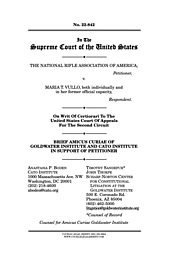Learn more about Cato’s Amicus Briefs Program.
From 2016 to 2019, Maria Vullo served as New York State’s Superintendent of the Department of Financial Services. In that position, Vullo had significant power to oversee and regulate banks and insurance companies operating in New York. Vullo’s title gave her the responsibility to ensure compliance with New York’s banking and insurance laws. But the National Rifle Association (NRA) alleges that Vullo also used her power for an improper and unconstitutional purpose: stifling speech and advocacy that she opposed.
During her tenure in office, Vullo issued guidance letters and a press release urging banks and insurance companies to sever ties with the NRA, warning those institutions of the “reputational risks” of doing business with “gun promotion organizations.” She spoke approvingly of the “social backlash” against “organizations that promote guns that lead to senseless violence.” And in a press release, she praised those institutions that had already cut ties with the NRA and urged more to do so in order to “promote public health and safety.”
The NRA sued Vullo, arguing that she had used the power of her office to coerce private institutions and punish the NRA for its advocacy. But the U.S. Court of Appeals for the Second Circuit dismissed the lawsuit, finding that none of Vullo’s actions or statements were impermissibly coercive. Now the Supreme Court has taken the case, and Cato has joined the Goldwater Institute’s amicus brief urging the Supreme Court to reverse the Second Circuit.
As our brief explains, the Supreme Court has held that the First Amendment prohibits informal coercion and retaliation no less than direct punishment of free speech. When determining whether such coercion has occurred, courts must consider the full context, including power imbalance, availability of judicial oversight, and regulatory dynamic. Bantam Books v. Sullivan (1963).
These First Amendment principles are even more important today than they were when Bantam Books was decided. In today’s hyper-regulated state, more Americans than ever depend on the good graces of regulators, which exponentially increases the risk of informal censorship. Our brief notes that Americans are increasingly subject to complex regulatory regimes that give officials immense leverage to coerce them into disassociating from certain speakers and ideas.
In many instances, politicians and bureaucrats have made public statements applying just such pressure to regulated entities. This trend is especially pronounced in the realm of social media regulation, but it is just as problematic in other areas like “Environmental, Social, and Governance” regulation, and so-called “transparency” initiatives requiring donor disclosure for nonprofits and advocacy groups.
Our brief urges the Supreme Court to pay special attention to context and power relations when evaluating claims of improper government coercion. The more powerful the official, the subtler the coercion may appear from the outside. Nevertheless, the Court should reaffirm Bantam Books and hold that the First Amendment prohibits government officials from using threats of adverse regulatory action to coerce people or businesses into disassociating from speakers or ideas.
View this case’s court docket, including the full opinion, here.

This work is licensed under a Creative Commons Attribution-NonCommercial-ShareAlike 4.0 International License.


